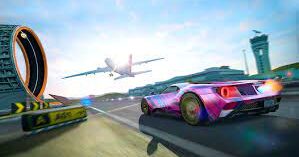In the dynamic landscape of online gaming, few titles have made as profound an impact as Fortnite. Beyond its innovative gameplay and cultural significance, Fortnite has become synonymous with epic in-game events that redefine the boundaries of interactive entertainment. This article delves into the phenomenon of Fortnite events, exploring their evolution, impact on the gaming community, and the groundbreaking experiences that have set the game apart.
Fortnite, developed by Epic Games, burst onto the scene in 2017, introducing the battle royale genre to a global audience. While its engaging gameplay and vibrant graphics quickly gained attention, it was the incorporation of live, in-game events that elevated Fortnite to a league of its own.
The first notable event, “The Rocket Launch,” occurred in 2018 and marked the beginning of a new era in gaming. Millions of players worldwide gathered in the virtual realm to witness an in-game rocket launch that shattered expectations. This event laid the foundation for what would become a series of groundbreaking experiences, each more ambitious than the last.

The Evolution of Fortnite Events
Fortnite events have evolved from simple in-game occurrences to complex, narrative-driven experiences that unfold in real-time. These events transcend traditional gaming boundaries, drawing inspiration from various entertainment mediums, including movies, music, and pop culture.
The “Butterfly Event” in 2018 showcased Fortnite’s narrative prowess. Following the cube’s mysterious appearance in the game, players were transported to a surreal dimension where a butterfly, a symbol of transformation, played a central role. This event blurred the lines between gaming and storytelling, setting a precedent for future immersive experiences.
Collaborations and Crossovers
Fortnite events are not confined to the virtual realm; they extend into the real world through high-profile collaborations. The game has partnered with iconic franchises, musicians, and even film studios, creating a unique synergy between gaming and mainstream entertainment.
The “Fortnite x Marvel” crossover, exemplified by the “Galactus Event” in 2020, stands as a testament to the game’s cultural impact. Players witnessed the arrival of Galactus, a cosmic entity, in an event that seamlessly blended the Marvel Universe with the Fortnite landscape. This crossover not only thrilled gamers but also showcased the potential for collaboration between gaming and the broader entertainment industry.
Musical Experiences in Fortnite
Fortnite events have redefined the concert experience, with the game hosting virtual concerts that transcend the limitations of physical venues. The “Travis Scott Astronomical Event” in 2020 was a groundbreaking concert that attracted over 27 million players. Travis Scott’s larger-than-life avatar performed in a surreal landscape, accompanied by dazzling visuals and synchronized animations.
The success of the Travis Scott event paved the way for other musicians to explore the potential of virtual performances within Fortnite. Artists like Marshmello, Ariana Grande, and even iconic bands like BTS have embraced the platform, turning in-game events into global music spectacles.
Social Spaces: The Role of the Fortnite World
Fortnite events go beyond traditional gaming experiences by transforming the game into a social space. The game’s evolving map, often altered by events, becomes a canvas for communal interaction. Players witness and participate in events together, fostering a sense of community and shared experiences.
The “The End Event” in 2019, which concluded Fortnite Chapter 1, exemplifies the transformative nature of these social spaces. As the game’s map was sucked into a black hole, players were left in suspense for days. This event not only marked the end of a chapter but also created a collective anticipation and speculation among players, fueling the sense of community within the Fortnite universe.
Technical Marvels: Behind the Scenes of Fortnite Events
The execution of Fortnite events involves intricate planning and cutting-edge technology. Epic Games employs a combination of server scalability, live-rendering techniques, and meticulous choreography to ensure that millions of players experience these events simultaneously without technical hiccups.
The live and real-time nature of these events presents a unique set of challenges. The game’s servers must seamlessly handle the influx of players, ensuring a smooth and synchronized experience. The technical achievements of Fortnite events have set a standard for the gaming industry, pushing the boundaries of what is possible in an online multiplayer environment.
Monetization and Business Model
Fortnite events are not just about spectacle; they are also a key component of the game’s monetization strategy. The events serve as promotional platforms for in-game purchases, such as exclusive skins, emotes, and other cosmetic items. Limited-time offerings tied to events create a sense of urgency among players, driving engagement and revenue for Epic Games.
The “Fortnite Battle Pass” plays a pivotal role in the game’s business model. Players can purchase the Battle Pass to unlock exclusive challenges, cosmetics, and other in-game rewards. Fortnite events often coincide with the release of a new Battle Pass, generating excitement and incentivizing players to invest in the premium content.
The Impact on Gaming Culture
Fortnite events have left an indelible mark on gaming culture, influencing how players perceive and engage with video games. The live and communal nature of these events has transformed gaming into a shared experience, akin to watching a blockbuster movie or attending a live concert.
The phenomenon of “event gaming” has become a cultural touchstone, with players anticipating and participating in these virtual spectacles. Social media platforms buzz with discussions, memes, and reactions, creating a global conversation around each Fortnite event. The shared experiences fostered by these events contribute to the sense of community among players.
Criticism and Controversies
While Fortnite events have garnered widespread acclaim, they have not been without their share of criticism and controversies. Some players argue that the emphasis on in-game events detracts from the core gameplay experience, with concerns about the game becoming more about spectacles than skill-based competition.
Controversies also arise regarding the monetization aspects, with accusations of creating a “pay-to-win” environment. The reliance on in-game purchases tied to events has led to debates about the impact on player fairness and the integrity of the gaming experience.
Looking to the Future
As Fortnite continues to evolve, the future of in-game events holds exciting possibilities. The integration of emerging technologies, such as virtual reality (VR) and augmented reality (AR), could further enhance the immersive nature of these experiences. The potential for even larger collaborations with entertainment franchises, musicians, and artists may redefine the boundaries of what is achievable within the gaming landscape.
Conclusion
Fortnite events have redefined the gaming experience, transcending the boundaries of traditional gameplay to become cultural phenomena. From narrative-rich storytelling to high-profile collaborations and virtual concerts, these events showcase the limitless potential of interactive entertainment. As Fortnite continues to push the envelope, it remains a trailblazer in the gaming industry, setting new standards for creativity, technical innovation, and community engagement. The evolution of Fortnite events reflects a paradigm shift in how we perceive and participate in gaming, leaving an enduring legacy in the digital landscape.




